Concrete Construction: 6 PDH
$36.00
Concrete is one of the most important construction materials. It is comparatively economical, easy to make, offers continuity and solidity, and will bond with other materials.
In this course the student will understand essentially all aspects of concrete construction including characteristics, mix design, formwork, joints, placement, finishing, and pre-cast. Instructor: Raymond Bosek, PE
SPECIFIC KNOWLEDGE OR SKILL OBTAINED
This course teaches the following specific knowledge and skills:
- Define characteristics of concrete
- Identify ingredients essential for good concrete
- Calculate concrete mix designs
- Determine methods and mixing times of concrete
- Describe the types of concrete forms and their construction
- Determine the types of ties for and placement of reinforcing steel
- Determine the location of construction joints
- Determine proper occasions for using the concrete saw
- Describe the proper procedures for placing concrete
- Describe the methods available for consolidating concrete
- Describe the finishing process for the final concrete surface
- Determine projects suitable for and lifting methods necessary for precast and tilt-up construction
CERTIFICATE OF COMPLETION
You will be able to immediately print a certificate of completion after passing a 21 question multiple-choice quiz. The quiz can be retaken unlimited times until a passing grade of 70% or better is earned. This course satisfies six professional development hours (PDH) of continuing education.
Related Courses
Engineering Description of Soils and Rocks: 4 PDH
$24.00 Add to cartIn this course the student will understand the engineering characteristics of soils and rocks and to how to properly identify and classify to develop a subsurface profile for site evaluations.Instructor: Raymond Bosek, PESPECIFIC KNOWLEDGE OR SKILL OBTAINED
This course teaches the following specific knowledge and skills:
- Discuss soil descriptions and standards
- Explain soil classification and properties
- Discuss practical aspects of fine-grained and course-grained soils
- Explain rock descriptions and classifications (SPT)
- Understand subsurface profile development
CERTIFICATE OF COMPLETION
You will be able to immediately print a certificate of completion after passing a 20 question multiple-choice quiz. The quiz can be retaken unlimited times until a passing grade of 70% or better is earned. This course satisfies four (4) hours of professional development (PDH).
Preview CourseClick “Preview Course” to view prior to purchaseClick “Add to Cart” to purchaseDesign of Hydraulic Steel Structures: 4 PDH
$24.00 Add to cartProper design, construction, and maintenance of hydraulic steel structures (HSS) is imperative for safe operation and reliable service over the structure’s lifetime. Engineers charged with the responsibility of maintaining these structures must be familiar with the basics of HSS design, as well as the intricacies of the structure’s abilities and limitations. This 4 hour interactive course prescribes guidance for (a) designing hydraulic steel structures (HSS) by load and resistance factor design (LRFD) and (b) fracture control. Allowable stress design (ASD) guidance is provided as an alternative design procedure or for those structure types where LRFD criteria have yet to be developed.Instructor: Raymond Bosek, PEProper design, construction, and maintenance of hydraulic steel structures (HSS) is imperative for safe operation and reliable service over the structure’s lifetime. Engineers charged with the responsibility of maintaining these structures must be familiar with the basics of HSS design, as well as the intricacies of the structure’s abilities and limitations. This 4 hour interactive course prescribes guidance for (a) designing hydraulic steel structures (HSS) by load and resistance factor design (LRFD) and (b) fracture control. Allowable stress design (ASD) guidance is provided as an alternative design procedure or for those structure types where LRFD criteria have yet to be developed. Hydraulic steel structures are lock gates, tainter gates, tainter valves, bulkheads and stoplogs, vertical lift gates, components of hydroelectric and pumping plants, and miscellaneous structures such as lock wall accessories, local flood protection gates, and outlet works gates. HSS may be subject to submergence, wave action, hydraulic hammer, cavitation, impact, corrosion, and severe climatic conditions.
SPECIFIC KNOWLEDGE OR SKILL OBTAINED
This course teaches the following specific knowledge and skills:
- Discuss the benefits of the LRFD method over the ASD method of designs
- List the modes of failure for HSS and what design principles are used to address these issues
- Describe the types of HSS and their corresponding uses and allowable stress loads
- Name the different types of HSS connections, including their design specifications and appropriate uses
CERTIFICATE OF COMPLETION
You will be able to immediately print a certificate of completion after passing a 20 question multiple-choice quiz. The quiz can be retaken unlimited times until a passing grade of 70% or better is earned. This course satisfies 4 professional development hours (PDH) of continuing education.
Preview CourseClick “Preview Course” to View Prior to PurchaseClick “Add to Cart” to Purchase and Access Quiz



